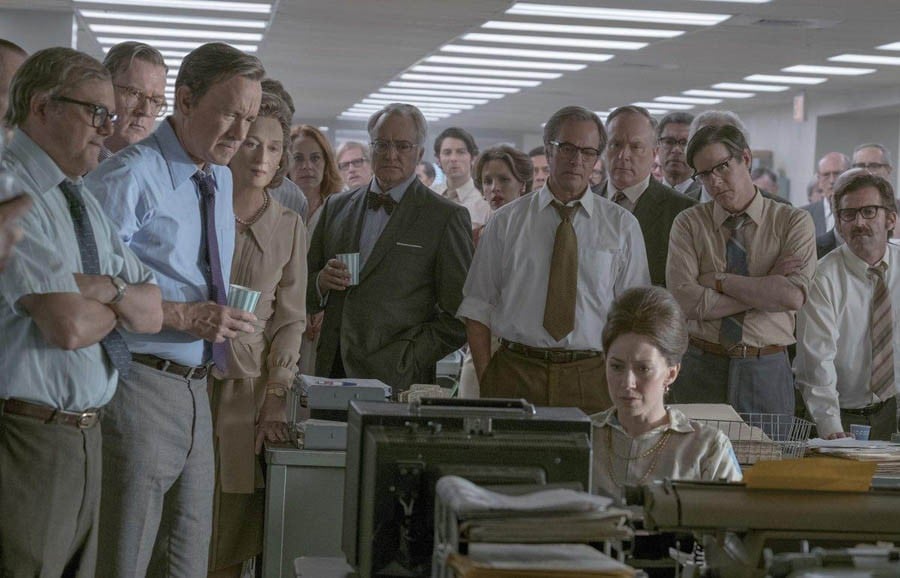
Spielberg’s new film highlights the dangers facing press freedoms today

Dear All,
Steven Spielberg’s new film is about journalists, publishers, press freedom, a despotic-minded president and a government lying to its own people. It is also about changing attitudes towards women and deeply entrenched male chauvinism.
The Post tells the story of how, in 1971, The Washington Post weighed in on the side of press freedom on the issue of the Pentagon Papers. These papers refer to the report on the Vietnam war that a whistleblower (Daniel Ellsberg) leaked to the press and which revealed that successive US administrations, from Eisenhower to Nixon, had lied (systematically) to the people about the Vietnam War: they knew it was pointless and that America could not win yet they continued to draft their young men into the war, sending many of them to certain death.
Ellsberg along with a network of volunteers gave the papers initially to The New York Times which scooped the story. But when the Nixon White House slapped an injunction on the NYT, a staffer of the Post (Ben H. Bagdikian) was able to trace the source (i.e. Ellsberg) who gave the documents to that paper and the Post despite ‘warnings’ from the White House, published more material on the story, joining the NYT in the fight for press freedom. Other papers followed suit by reporting The Washington Post story as well as other stories on their front pages (Ellsberg was able to get the material out to about two dozen newspapers). The Supreme Court then ruled in favour of the press and upheld the First Amendment.
What is all the more remarkable about the Post’s actions is that all this happened in the week that the paper (previously a private company) had gone public and investors could easily have pulled out in a climate of uncertainty about its direction.
Spielberg’s film tells the story of how the paper’s owner and publisher, Katharine Graham decided the issue, and agreed that it should go ahead. It also shows how in light of the revelations both she and the paper’s editor Ben Bradlee reflect upon and rethink their relationships with presidents and those in power. It is worth recalling that it was later The Washington Post that broke the Watergate scandal where Bob Woodward and Carl Bernstein reported a story which rocked the American presidency and ousted a president.
The film is nostalgic in its portrayal of old fashioned journalism (the shots with the printing presses rolling are terrific) but it is also very inspiring in the way it looks at the public interest aspect of what good reporting and principled journalism involves.
Both Meryl Streep (as Graham) and Tom Hanks (as Bradlee) turn in excellent performances and the film remains fairly matter of fact about the whole matter. Nixon makes an appearance only as a voice and a silhouette, and his voice comes to us as if it has been secretly recorded -- a clever reference to the Watergate tapes. In the end he is heard blasting the Post and barring its staff from any White House events, something eerily reminiscent of the sort of tone that President Trump has taken with the independent media.
In this context it is worth mentioning a very good conversation that The Guardian newspaper published in which its reporter Ewen MacAskill spoke to Daniel Ellsberg and Edward Snowden on the issue of whistleblowing. Ellsberg comments, "the movie is incredibly timely because we are dealing with a President who lies….and is contemptuous of the press. Nixon called the press the enemy. And Trump’s people say it is the opposition party, which is of course the enemy."
Ellsberg goes on to say that he believes that Trump "will indict journalists". He also says that it is quite possible that this US president is likely to break the first amendment to the constitution (which protects press freedom). His contention is that the climate has changed and that this was the case under President Obama "who prosecuted three times as many people for leaking as all previous presidents put together -- he prosecuted nine."
And it is inspiring to see that in this interview/conversation both whistleblowers Edward Snowden and Daniel Ellsberg agree completely that despite the price (threats, prosecution, exile) of their actions, they would do the same thing again because "it was the right thing" to do.
The right thing? Do try to see The Post, and encourage as many young people to see it as possible.
Best wishes